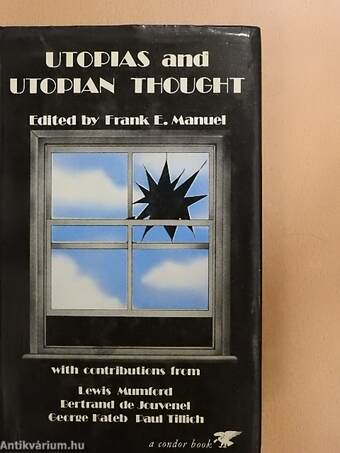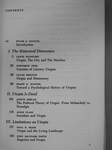1.035.157
kiadvánnyal nyújtjuk Magyarország legnagyobb antikvár könyv-kínálatát

VISSZA
A TETEJÉRE
JAVASLATOKÉszre-
vételek
Utopias and Utopian thought
| Kiadó: | Souvenir Press (Educational & Academic) Ltd |
|---|---|
| Kiadás helye: | |
| Kiadás éve: | |
| Kötés típusa: | Fűzött keménykötés |
| Oldalszám: | 321 oldal |
| Sorozatcím: | Condor Book |
| Kötetszám: | |
| Nyelv: | Angol |
| Méret: | 22 cm x 14 cm |
| ISBN: | 0-285-64722-9 |
| Megjegyzés: | További kapcsolódó személyek a könyvben. |
naponta értesítjük a beérkező friss
kiadványokról
naponta értesítjük a beérkező friss
kiadványokról
Fülszöveg
UTOPIAS AND UTOPIAN THOUGHT
Edited by Frank E. Manuel
When we ask what the phrase "Great Society" means, we are actually thinking about an age-old idea—that of Utopia, the ideal society. Here is a collection of essays by leading scholars in many fields that explore the reasons why men have been yearning for Utopia—or scorning it—at least since Plato's time.
As Frank Manuel points out in his Introduction to this volume, Utopian inquiry has, throughout its history, taken two forms. There have been, first of all, the descriptions of an ideal state, the "speaking pictures" in Sir Philip Sydney's phrase, of which the most famous is Utopia by Thomas More. But there have also been works in which the moving principles of ideal societies are debated and critically evaluated. In the first group of essays, we see something of the history of both forms of Utopian inquiry. Lewis Mumford identifies the archetypal city that emerged just prior to the beginning of recorded history as the first... Tovább
Fülszöveg
UTOPIAS AND UTOPIAN THOUGHT
Edited by Frank E. Manuel
When we ask what the phrase "Great Society" means, we are actually thinking about an age-old idea—that of Utopia, the ideal society. Here is a collection of essays by leading scholars in many fields that explore the reasons why men have been yearning for Utopia—or scorning it—at least since Plato's time.
As Frank Manuel points out in his Introduction to this volume, Utopian inquiry has, throughout its history, taken two forms. There have been, first of all, the descriptions of an ideal state, the "speaking pictures" in Sir Philip Sydney's phrase, of which the most famous is Utopia by Thomas More. But there have also been works in which the moving principles of ideal societies are debated and critically evaluated. In the first group of essays, we see something of the history of both forms of Utopian inquiry. Lewis Mumford identifies the archetypal city that emerged just prior to the beginning of recorded history as the first Utopia, and traces its tragic history. Northrop Frye examines some of the literary Utopias since More's time. Crane Brinton sees democracy as a Utopian impulse in American history and cautions intellectuals not to despise it. Finally, Frank Manuel, in a second essay, distinguishes among the "Utopias of calm felicity" preceding the French Revolution, the "open-ended Utopias" of the nineteenth century, and the "eupsy-chias" of the twentieth.
Utopias have always aroused strong positive or negative reactions. Judith Shklar and Adam Ulam tell us, in the second group of essays, that Utopia is dead and probably should remain so. Other contributors caution us in the third section not to place complete faith in technological advances that seem to promise Utopia tomorrow: Paul Sears, John Maynard Smith, and John R. Pierce discuss the limits of the possible in the fields of ecology, eugenics, and communications, respectively. Still other Continued on back flap
Continued from front flap
contributors are more hopeful, however, that Utopias can be realized in part, and in the fourth group of essays Maren Lockwood studies one nineteenth-century attempt, the community of Oneida, while François Bloch-Lainé and Bertrand de Jouvenel describe the ways in which Utopian thought can be brought to bear on the twentieth-century condition.
Utopian hopes ultimately affect man's moral nature. In the fifth group of essays George Kateb argues that the goal of any Utopia must be the contemplative life, while Mircea Eliade examines two radically different societies that for generations have clung to the dream of finding paradise-on-earth. Frederik L. Polak then calls for a new kind of Utopian thinking to meet the challenges of an automated society without work. And finally, the late Paul Tillich defends Utopias as necessary for human life and sets up a model for relating them to the Kingdom of God. Vissza
Témakörök
- Idegennyelv > Idegennyelvű könyvek > Angol > Művelődéstörténet
- Idegennyelv > Idegennyelvű könyvek > Angol > Történelem > Egyéb
- Művelődéstörténet > Eszmetörténet > Történelem > Politika
- Művelődéstörténet > Átfogó művek, tanulmányok
- Filozófia > Témaköre szerint > Tanulmányok, esszék
- Idegennyelv > Idegennyelvű könyvek > Angol > Filozófia > Témaköre szerint > Tanulmányok, esszék
- Történelem > Idegennyelvű > Angol
- Filozófia > Témaköre szerint > Társadalomfilozófia > Egyéb
- Idegennyelv > Idegennyelvű könyvek > Angol > Filozófia > Témaköre szerint > Társadalomfilozófia > Egyéb
- Történelem > Politika > Politológia
- Történelem > Politika > Ideológiák > Egyéb
- Történelem > Tanulmányok
Megvásárolható példányok
Nincs megvásárolható példány
A könyv összes megrendelhető példánya elfogyott. Ha kívánja, előjegyezheti a könyvet, és amint a könyv egy újabb példánya elérhető lesz, értesítjük.








